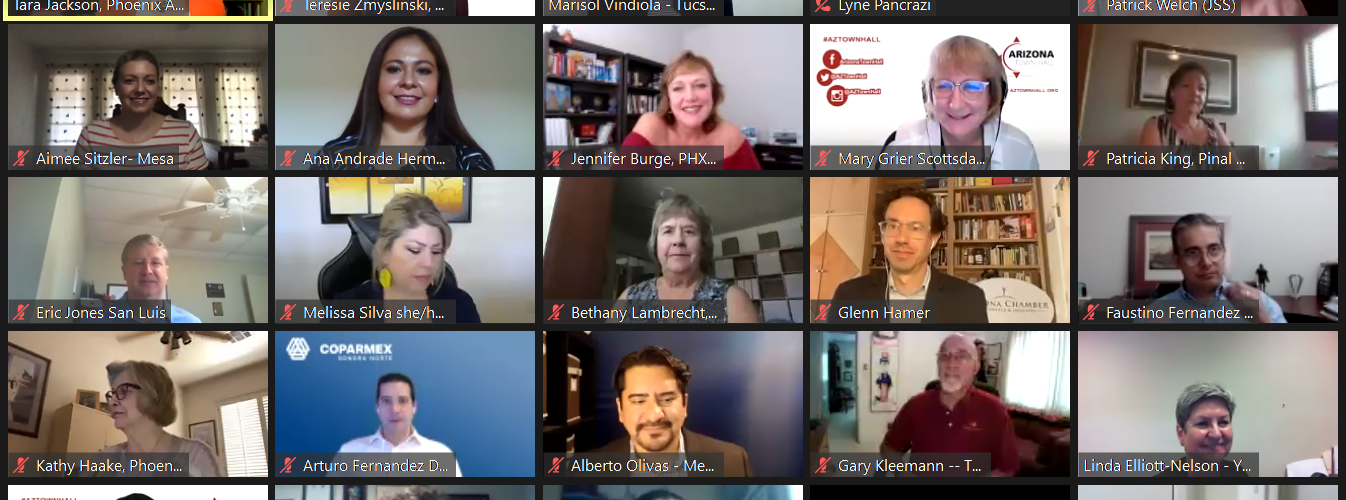Business and civic leaders met virtually to discuss the opportunities that Arizona and its sister state, Sonora, Mexico, should focus on during COVID-19 and beyond to strengthen cross border trade during the Arizona and Mexico Town Hall last week.
Now that the new United States Mexico-Canada Agreement (USMCA) is in effect, the two countries are strategically positioned to expand commerce in the region, participants said.
Expanding e-commerce, improving ports of entry and travel corridors, and tapping into colleges to produce more qualified workers for the region were among the top recommendations.
About 70 people from Arizona and Sonora attended the event, Cross-Border Connecting: Implementation of the USMCA — Opportunities for Arizona and Sonora. Phoenix law firm Jennings, Strouss and Salmon sponsored the event.
Glenn Hamer, the president and CEO of the Arizona Chamber of Commerce, was the featured speaker. He talked about why the USMCA, which updates and expands on NAFTA, is so important for both states, improvements in the new agreement, and the need to protect free trade during the coming elections.
There’s much at stake, particularly now with economies struggling during the coronavirus, Hamer said.
“If you take a look at just the numbers since NAFTA went into effect, they’re staggering. Before the world stopped, Arizona’s trade relationship with Canada and Mexico was worth $20 billion (annually). For the U.S., the trading block is worth $1.3 trillion.”
Hamer spoke of the improvements in the new modernized agreement including a new chapter to help small and medium businesses benefit more from trade, new protections for digital trade and intellectual property, and de minimis rules that raise thresholds from 7 to 10 percent, which provide cost savings by allowing more cross-border shipments to occur that won’t be required to be conducted as formal customs transactions.
Most essential element of new deal: duty-free trade
But by far, the most essential ingredient in the new deal is that it maintains “duty-free, tax-free” trade between the three countries, Hamer said.

“This is the world’s most prosperous trading block. It is that big a deal and it affects every sector of the economy, whether its financial services, energy, manufacturing, health care, agriculture, semiconductors, electronics, mining, tourism — you couldn’t pick an important sector of our state’s economy that hasn’t been affected in a positive way,” Hamer said
“And the same goes for direct foregn investment. Our friends from Canada are far and away the largest source of foreign direct investment (FDI) into Arizona. In terms of Arizona and the United States, we’re the biggest source of FDI in Canada and Mexico.”
Recommendations
During breakout sessions, participants targeted opportunities to focus on to improve regional tourism and commerce. Among the most mentioned were:
-Expand ecommerce, particularly during COVID-19, to increase shipping at a time when consumers and businesses need it most
-Encourage investment in border points of entry to streamline processes and move cargo and tourism traffic more quickly and safely
-Invest in the modernization of heavily traveled tourist and cargo corridors
-Promote relationships between municipalities and states on projects, including messaging to inform Americans about safety protocols in communities like Rocky Point that are taking measures to protect visitors from COVID-19
-Support more cross border relationships between business and industry with universities, colleges and trade schools to produce workers for the region
About Arizona and Mexico Town Hall
The Arizona and Mexico Town Hall is part of the nonprofit Arizona Town Hall that “brings diverse people together to solve critical and often divisive policy issues.”
“The goal of these programs is to strengthen the economic opportunities as well as the quality of life for Arizonans and Sonorans as sister states who work together, and to show by example to the other states of our nations how we can work together to improve each others lives by building these cultural bridges,” said Tara Jackson, president of the Arizona Town Hall.
To read more about the town hall, visit: Arizona and Mexico Town Hall.
To read more about how the USMCA benefits Arizona and the U.S., go to: USMCA.















Add comment